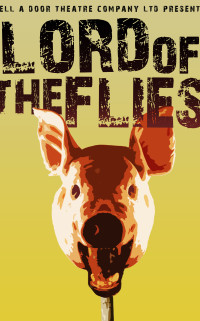The story takes a look at what would happen if a group of British schoolboys were to become stranded on an island. Their leader is Ralph, and at first the boys have good intentions. For instance, they keep a fire going so that a passing ship can see the smoke and rescue them, however because of the inherent evil of the many the good intentions of the few are quickly passed over for more exciting things. A boy called Jack, who thinks he should be the leader and who rarely agrees with Ralph mainly causes this. The killing of a pig slowly begins to take over the boys life, and they begin to go about this in a ritualistic way, dancing around the dead animal and chanting. As this thirst for blood begins to spread the group is split into two groups: the more rational boys (fire-watchers), who are led by Ralph, pitted against the hunters, of who Jack’s the leader. The younger members of the group perpetuate the fear of a beast and they are forced to do something about it. During one of the hunters' celebrations around the kill of an animal a fire-watcher (Simon) stumbles in to try and disband the idea of the monster. Caught of in the rabid frenzy of the dance, this fire-watcher suddenly becomes the monster and is brutally slaughtered by the other members of the group. The climax of the novel is when the hunters are confronted by the fire-watchers. The hunters had stole Piggy's (one of the fire-watchers and Ralph’s assistant) glasses so that they may have a means of making a cooking fire. One of the more vicious hunters roles a boulder off of a cliff, crushing Piggy, and causing the death of yet another rational being. The story concludes with the hunters hunting Ralph. After lighting half of the island on fire in an attempt to smoke Ralph from his hiding place, they chase him on to the beach only to find a ships captain and crew waiting there to rescue them, because he saw the smoke. Connection to the theme
This is a story about boys, all alone and abandoned on an island. This leaves the growing up entirely up to themselves. After all, there are no parents or other adults around. There is a certain connection to the theme, because you see the characters develop themselves (and therefore growing up in a sense). But I don’t think the writer intended to write a story about children left alone, who are to grow up without any parental help. I think Golding shows us what would happen if we were to live without all the rules of civilisation. For a moment sense and rationality are maintained, but after a while savagery would strike. So the development of the characters could be related to the theme, but it mainly points out the effects of living without rules on humankind. Characters
Lord of the Flies is a well written. Well thought out writing that depicts the evils of human nature. The framework of the novel is simple, and reading it wasn’t too difficult. The only difficulty I found whilst reading, were the circumstances. Especially where it was, and why they were fleeing in a plane. The book is full of symbolism, which almost gives an extra dimension to the book. Lord of the Flies is a great book, and I’d recommend anyone to read it.










REACTIES
:name
:name
:comment
1 seconde geleden